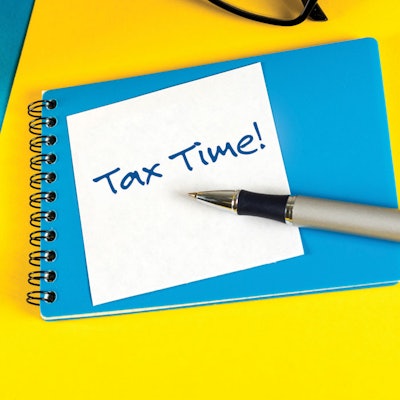
With tax day fast approaching, we offer advice to help reduce your bill and avoid an audit.
“Thinking is one thing no one has ever been able to tax,” American inventor and businessman Charles F. Kettering once said, but everything else, it seems, is fair game. So what are the most important things salon owners and nail techs need to know before filing their taxes this year?
“The 2017 Tax Cuts and Jobs Act is 14,000 pages long, and we’re still getting clarification from the IRS as to how they’re going to handle some items,” says April McDaniel, a Certified Public Accountant (CPA) with Kopsa Otte in York, Nebraska, who works with salon owners, beauty professionals and other small businesses. Her advice: If you haven’t used a tax professional to prepare your taxes in the past, this might be the year to start.
The first thing nail pros should be aware of is the Qualified Business Income Deduction, or QBID, which allows qualifying salon owners and independent contractors to deduct 20 percent from their net income right off the top. “If you’re showing a profit from your business, you can benefit from this extra deduction,” says Carol Hammontree Bates, owner of Income Tax Solutions outside of Mobile, Alabama. “Let’s say that you’re a nail tech who earned $80,000 this year. The QBID could save you $16,000, which is huge.”
Qualified business income includes sole proprietorships and pass-through income from partnerships and S-corporations. C-corporations do not qualify for this deduction. Since beauty professionals who rent space in a salon are self- employed, they qualify for the QBID. Still, this is uncharted territory, which is why it’s a good idea to consult a professional before claiming this deduction.
Another thing to keep in mind this year: If you’ve been remiss in accurately reporting income from tips in the past, McDaniel suggests being more diligent now that the Internal Revenue Service (IRS) has released the results of a year-long study on unreported tip income, which they determined to be about $23 billion. “I feel like there will be more of an effort to audit tips in the future,” says McDaniel, who stresses the importance of keeping accurate financial records in general, especially in light of all the changes in the tax code. “It’s never too late to start keeping documentation. You can audit-proof yourself by maintaining good records.” A number of her clients use QuickBooks, an accounting software package that helps small
businesses manage sales and expenses and keep track of daily transactions. “It won’t store mileage logs or receipts,” she says, “but it can help you keep track of your transactions. Choosing salon management software that makes it easy to pull and analyze reports aids in keeping accurate records.”
RELATED: The Ins and Outs of Accepting Gratuities
Jaime Schrabeck, owner of Precision Nails in Carmel, California, has been using Quicken, a personal finance management tool, for 25 years in order to track her business and personal finances. “I manually enter transactions, assign categories and check the websites of my financial institutions to stay updated,” she says. “At the end of the year, I can immediately produce the information my CPA needs to prepare my taxes.”
“[I like to] take the maximum advantage of deductions available, but to do that you’ve got to keep accurate, updated records,” says Claudia Papa, owner of Aqua Nail Bar in Santa Barbara, California. “I’m by nature a Luddite, but I’ve learned how to harness technology to provide data that can help me run my business more efficiently. I use one credit card for all my business expenses, which are then automatically downloaded into QuickBooks Online.”
Finally, Bates issues a warning about misclassification—the practice of knowingly misclassifying an employee as an independent contractor, which can result in some hefty fines in states like California. “If you’re being asked to answer phones or perform other tasks for which you’re not getting minimum wage, you should be on a W-2,” she says. “If you’re renting space in a salon, you should issue a 1099 to the salon owner documenting the amount of rent you paid that year. No one does this, but the IRS says it’s the law, and it’s a way to prove to the IRS that you’re operating a business.”

The Low Down on Deductions
With the release of the new tax code, here are 16 deductions you can take this year to reduce your tax burden. Keep in mind that these deductions are not available if you receive a W-2 from your employer.
RELATED: Memberships Can Provide Salons with a Reliable Source of Income
- Rent: You can deduct the full amount of rent you pay as a salon owner or as an independent contractor.
- Cell Phone Usage: Keep track of how much you use your cell phone for business. Do you allow clients to book appointments that way? A good rule of thumb is to claim 50 percent of your bill.
- Travel: Although you can’t deduct your daily commute, you can claim mileage for, say, driving to and from the beauty supply store or driving to a trade show. Keep a log of all trips taken throughout the year. The standard deduction is about 59 cents per mile; your tax professional will compute it for you if you provide a record. You can also deduct the cost of airfare to attend a trade show or other business-related event. Similarly, you can deduct the cost of a hotel if you have to stay overnight at a business-related event.
- Supplies: You can write off consumables—everything from towels and cuticle oil to nail polish and other supplies—that you purchase to conduct business.
- Insurance: If you’re paying for general liability insurance, you can deduct the premium. You can also deduct the premiums for health insurance through a private policy. Your tax preparer can let you know if you qualify.
- Individual Retirement Account: You can deduct what you pay into an IRA if you have one.
- Entertainment: If you host an annual holiday party for your staff, you can deduct the cost of food and beverages, but not the cost of entertainment, like a band.
- Charitable Deductions: You may deduct charitable donations in the form of cash and product giveaways.
- Capital Expenses: These might include furniture, computers, printers and other equipment.
- Cleaning Services: Salon owners can deduct the cost of a cleaning service.
- Advertising: If you’re buying ads online or in local papers or magazines, keep a record of these expenses.
- Salaries and Benefits Plans: Salon owners may deduct these expenses.
- Continuing Education: Both salon owners and independent contractors can deduct the cost of attending trade shows or taking classes and workshops designed to improve their skills or help them run their businesses more efficiently.
- Meals: If you bring lunch in for your staff, for example, it’s 50-percent deductible. Holiday parties are 100-percent deductible. Meals bought at trade shows or other business-related events are 100-percent deductible.
- Uniforms: You can deduct the cost of smocks, aprons or other clothing if you can’t wear them off the job.
- Licenses: You may deduct the fee to renew your cosmetology license.
Tip!
To keep abreast of changes to current tax law, sign up for Certified Public Accountant firm Kopsa Otte’s weekly newsletter for salon and spa owners at kopsaotta.com.
–by Marianne Dougherty
This story first appeared in the April issue of Nailpro magazine. To receive the magazine, click here to subscribe.
[Images: Getty Images]











